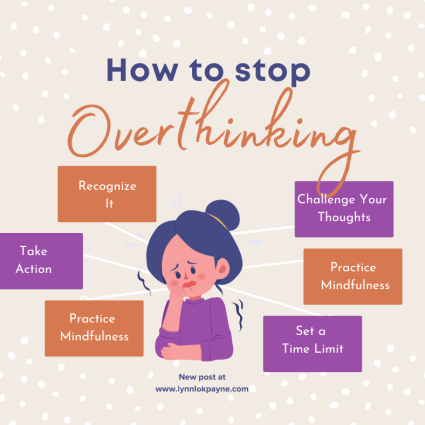Do you tend to overthink? Have you ever replayed a conversation in your head a dozen times, analyzing what you said. Or maybe you crafted a detailed list of “what if” scenarios about a situation that hasn’t happened yet. If you’re like me, you’ve fallen into the trap of overthinking. Overthinking can make you feel like you’re stuck on a mental hamster wheel, running endlessly but never really getting anywhere. It’s exhausting, frustrating, and sometimes paralyzing.
But there’s good news: You don’t have to stay stuck. You can get off the wheel. This post provides both personal advice and practical tips for conquering overthinking. Let’s get started!
The Overthinking Trap
What actually is overthinking? Essentially, overthinking happens when your mind gets hyper-focused and excessively analyzes and dwells on situations, inventing problems that didn’t exist.
While rooted in good intentions—such as making better decisions and preventing future mistakes—but it backfires if it keeps you from taking action. While it’s beneficial to examine the past, there’s no benefit to obsessing over something that has already occurred, wishing things were done differently. Or fixating on what might happen. Negative rumination is just worry or fear.
Overthinking can look like this: spending too much time crafting the “perfect” blog or email, repeatedly revising the same sentences. Or hesitating to make a decision because we are looking for the best possible outcome. The result? Stress, procrastination, and a lot of unnecessary self-doubt.
Breaking Free: Effective Strategies That Work
There’s no magic switch to conquer overthinking. It’s a process, one that involves awareness, practice, and a lot of self-compassion. Here’s some strategies worked for me—maybe they’ll work for you too.
1. Recognize Overthinking
The first step is to recognize when you’re overthinking. For me, it often feels like my thoughts are stuck in a continuous energy-sapping loop, or I catch myself fixating on tiny details. Once I can identify I’m overthinking, it becomes easier to step back, revise, and stop (or at least decrease) the rumination cycle.
2. Set a Time Limit
Set a deadline for decisions. For example, if you’re debating whether to RSVP to an event, set a timer for 5 or 10 minutes. When the timer goes off, make a decision and stick to it. This simple tip can help to keep you from spiraling down the endless analysis hole.
Another decision tip is when you have multiple options to choose from, like a dinner menu. If you stress over ordering the “perfect” entrée, take a couple of minutes to narrow your choices down to three. Now take another minute to pick one and let it go. Don’t second guess it. Even if it’s not the best, at least you made a decision. Or it could be a delightful surprise. This just happened to me. I had doubts about trying a new dish, but it ended up being wonderful.
3. Challenge Your Thoughts
Overthinking often involves catastrophic “what if” scenarios. “What if I say the wrong thing?” or “What if I make the wrong choice?” To counter this, start asking yourself: “What’s the worst that could realistically happen?” More often than not, the answer isn’t nearly as scary as you might imagine.
4. Focus on Taking Action
Overthinking thrives on inaction. One of the best ways to silence that inner voice is to take a small step forward. For example, instead of overanalyzing an email draft, just hit send. Instead of fretting over a big project, break it down into small, achievable steps and just start. Taking any form of action helps to counteract feelings of being overwhelmed.
Taking action helps to cut through the negative internal noise, building momentum, and creating feelings of accomplishment.
5. Practice Mindfulness
Mindfulness isn’t just about sitting cross-legged and meditating (though that’s great.) It’s about being present in the moment. When I’d catch myself spiraling, I’ll take a few deep breaths and focus on my breathing and surroundings. Grounding and connecting to oneself in the present helps to quiet the racing mind.
6. Adopt a Growth Mindset
Overthinking is often rooted in a fear of failure which can affect our self-worth. But what if failure wasn’t the end of the world? Embracing a growth mindset—the belief that mistakes are opportunities to learn—makes it easier to take risks without getting stuck in analysis paralysis. Been there, done that.
A Personal Story: My Turning Point
I remember one particular moment that changed everything. I was agonizing over a presentation for work, rewriting it for the third time and second-guessing every slide and every word. Finally, I thought, “Stop overthinking and trust yourself. It’s good enough.”
That’s when I realized I was letting my fear of imperfection hold me back. I decided to take a leap and present it as it was. And you know what? It went great. Not perfect, but great. That experience taught me that sometimes, “good enough” really is good enough.
Takeaway: Progress Over Perfection
Conquering overthinking doesn’t mean you’ll never overthink again. It’s about recognizing when you’re stuck and having the tools to move forward. It’s about choosing progress over perfection and giving yourself permission to be human.
So, the next time you find yourself trapped in a mental loop, take a deep breath in and breath out slowly. Remind yourself that you don’t have to have all the answers right now and that’s okay. Trust your instincts, take a small step forward, and know that growth is happening—one imperfect decision at a time.
For information on my books, visit https://amzn.to/4hml5zr





